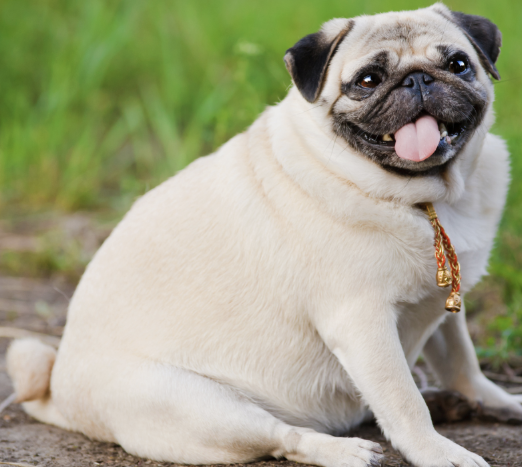Obesity in Dogs and Cats: What Lowcountry Pet Parents Need to Know
From lazy afternoons on the porch to indulgent table scraps, it’s easy for our furry friends to gain a few extra pounds. But when those pounds turn into obesity, it can have a serious impact on your pet’s health and longevity.
At Mount Pleasant Animal Hospital, we regularly see pets whose weight gain is affecting their mobility, energy, and even their risk for disease. Understanding the causes, risks, and solutions for pet obesity is the first step to keeping your four-legged family member happy and healthy.
Obesity in Dogs and Cats: Lowcountry Risk Factors
Obesity in dogs and cats can develop for many reasons, but some of the most common include:
- Overfeeding and high-calorie treats – Many commercial treats are packed with calories that add up fast.
- Lack of exercise – Hot, humid summers can make daily walks challenging, which may lead to inactivity.
- Age – Older pets tend to be less active and may have slower metabolisms.
- Breed and genetics – Certain breeds (like Labradors, Dachshunds, and Beagles) are more prone to weight gain.
- Medical conditions – Hypothyroidism, Cushing’s disease, or joint pain can contribute to weight gain.
Small weight increases can go unnoticed, but even just a few extra pounds can be significant for a pet—especially cats or small-breed dogs.
Obesity in Dogs and Cats: Health Risks
Extra weight doesn’t just mean a fluffier pet; it can shorten your pet’s lifespan and lead to serious health problems:
- Joint pain & arthritis – Excess weight puts added stress on joints, leading to discomfort and decreased mobility.
- Diabetes – Overweight cats are especially prone to developing diabetes.
- Heart disease & hypertension – Extra fat can lead to cardiovascular strain.
- Respiratory issues – Breathing can become more difficult for overweight pets, especially brachycephalic breeds (like Bulldogs or Persians).
- Shorter life expectancy – Studies show that lean pets live up to 2.5 years longer than their overweight counterparts.
For more information on health risks, check out this short video:
Obesity in Dogs and Cats: Signs Your Pet May Be Overweight
Not sure if your dog or cat is carrying a little extra weight? Here are some quick ways to check:
- Difficulty feeling ribs under a layer of fat
- Lack of a defined waist or abdominal tuck
- Slower to rise, play, or climb stairs
- Panting more than usual, even with light activity
If you notice these signs, schedule a weight check at your next wellness visit. Our team can help determine your pet’s Body Condition Score (BCS) and create a plan to get them back on track.
Obesity in Dogs and Cats: Prevention with Nutrition and Exercise
The best treatment is prevention. Here’s how you can keep your pet fit year-round:
- Measure meals – Use a measuring cup or kitchen scale to portion meals based on your vet’s recommendation.
- Choose the right diet – Ask us about prescription weight-loss diets or balanced maintenance foods.
- Limit treats – Keep treats to 10% or less of daily calories, or swap in healthy options like green beans or carrot sticks.
- Stay active – Take short, frequent walks during cooler parts of the day or engage in indoor play (laser toys, food puzzles).
- Regular weight checks – Early detection of weight gain allows for faster intervention.
Obesity in Dogs and Cats: How We Can Help Your Pet Lose Weight
If your pet is already overweight, don’t worry, there are many effective solutions available. Our team can create a tailored weight-loss plan that includes:
- Customized nutrition plans – We’ll recommend the right food and feeding schedule.
- Safe exercise recommendations – Including low-impact activities to protect joints.
- Medical screening – To rule out underlying conditions like thyroid or adrenal disease.
- Follow-up weigh-ins – To track progress and adjust the plan as needed.
For pets needing extra support, we’re proud to collaborate with our sister clinic, Shuler Veterinary Clinic, where Dr. Marian Shuler Holladay, DVM, CCRP, CVA, offers physical rehabilitation services, including sports conditioning, treadmill therapy, and targeted exercise plans, an excellent option for pets with mobility issues.
Obesity in Dogs and Cats: Your Partner in Pet Wellness
At Mount Pleasant Animal Hospital, we’re committed to helping Lowcountry pets live longer, healthier lives. Whether your pet needs a nutrition plan, medical work-up, or a rehabilitation program, we’re here to support you every step of the way.
Think your dog or cat may be overweight? Give us a call at (843) 884-4921 or request an appointment online.
Mount Pleasant Animal Hospital is proud to be part of Animal Hospitals of the Lowcountry, a family-owned network of practices that includes:
- Mount Pleasant Animal Hospital – South Mount Pleasant SC, At Coleman Blvd and Old Village
- Shuler Veterinary Clinic – Central Mount Pleasant SC, At Town Center
- Safe Harbor Animal Hospital – North Mount Pleasant SC, At North MP and Hwy 41
Together, we help pets across the Lowcountry live their healthiest, happiest lives.








